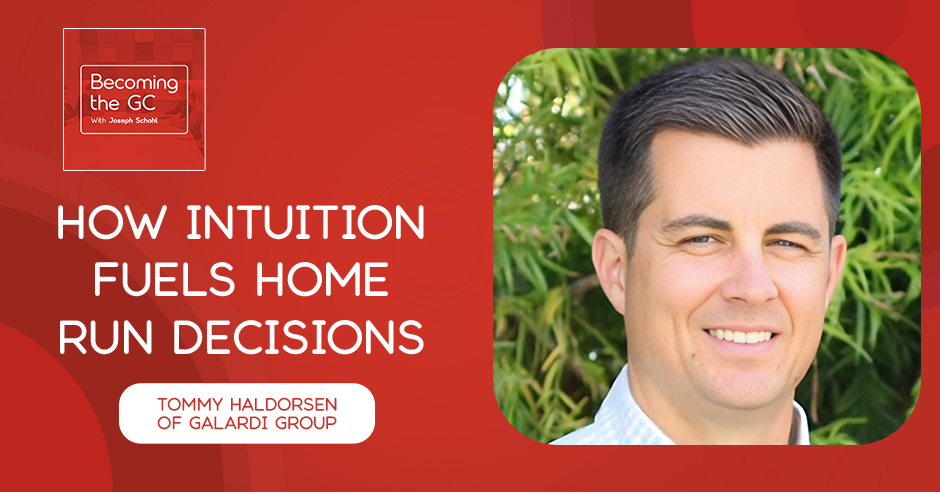
Trust your intuition—it’s the secret to hitting home runs in your career and personal life, according to Tommy Haldorsen, General Counsel at Galardi Group, Inc. Tommy dives deep into his career journey, sharing his experiences navigating tricky transitions, unique challenges, and triumphs of legal work. He also emphasizes the power of building strong, supportive teams – a crucial ingredient for success. Beyond the office, Tommy shares his passion for coaching his children’s sports teams, highlighting the importance of family and giving back to the community. Join us as Tommy proves that sometimes, the best decisions are the ones that simply feel right.
—
Listen to the podcast here
How Intuition Fuels Home Run Decisions: Tommy Haldorsen Of Galardi Group
Joe Schohl here. In this episode, we had Tommy Haldorsen. Tommy has had a phenomenal career so far and has done so while staying highly present to his family. Stay with me to the end, where I’ll share my key takeaways from the episode. This show is sponsored by Inside Counsel Academy, where in-house counsels go to elevate their careers while enhancing their lives. Also by GeneralCounselWest, a law firm that supports GCs of healthcare companies and their teams with an Inside Counsel mindset. Without further ado, I bring you Tommy Haldorsen.
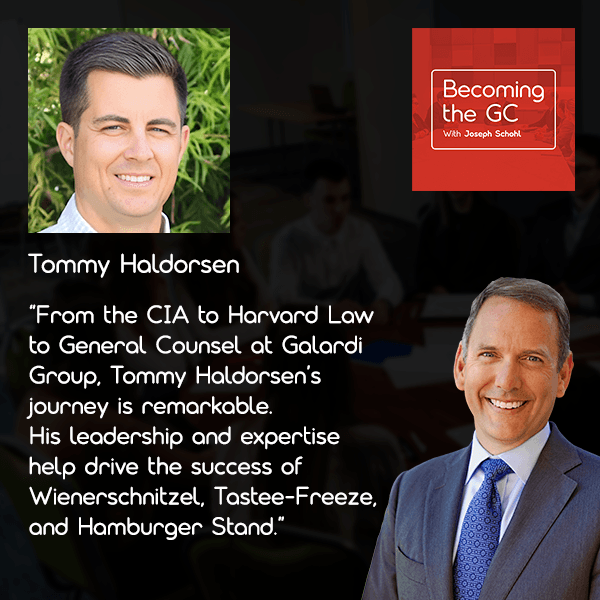
Our guest is Tommy Haldorsen. Tommy is the General Counsel of Galardi Group Inc., where he oversees legal affairs for the parent company of Wienerschnitzel, Tastee Freez, and Hamburger Stand. I’m getting hungry just saying that. He also spent time earlier in his career working for the Central Intelligence Agency, unless he tells me we can’t talk about that. Tommy, welcome to the show.
Thanks for having me, Joe. I’m excited to be here.
Tommy’s Career Path From CIA Dreams To Law School
Let’s jump right in and take me on your career path. Even take me before that, what made you decide to go to law school? I don’t want to miss the CIA part. Was that before or after?
That was before.
Start at college.
What inspired me to follow Law was my grandfather. He was a district attorney, then a judge in San Bernardino County, where I grew up. I always looked up to him. When I was little, I’d go to his courtroom. His photo was up on the wall. I thought it was a cool experience. I decided very early on that’s what I wanted to do, not knowing all that much about law, but I decided that was the path I was going to forge. I told everyone that I didn’t find anything that knocked me off that path. I appreciate where I am now because of it. I went to Notre Dame for undergrad, Go Irish. They had a tough championship game, but I’m proud of the team.
They did well at the end. There was a little risk it was going to get embarrassing there, but they came right back and had a good shot at the end.
I was worried it was going to be 50 to 7 before we knew it. It was a respectable game and a good showing. I went to Notre Dame, and one of the ideas I was exploring that could have knocked me off my lawyer career path was working for the government. They had a career fair at Notre Dame in the gym. There was a booth from the CIA there. I loved watching James Bond and Mission Impossible growing up. I thought, “This sounds like a great job,” not knowing much at all about it.
I talked to the folks in the booth and handed in my résumé. I’m from a small town in Southern California, not very exciting, not very well-traveled. I didn’t speak any other languages. I’m not sure what marketable skills I had, but they took my résumé. They invited me a few weeks later to an interview process in Chicago. I took a trip from South Bend to Chicago to a big hotel there. They had a bunch of interviews. I don’t recall the questions in the interview other than coming out of it thinking, “I bombed that interview. I have no chance to get that job.”
There was something I said that was acceptable enough that I was given a conditional offer of employment. This was between my sophomore and junior years of college. The conditional offer was not like a typical conditional offer, as you might expect when working for a top-secret government agency. I can’t remember the statistics, but a decent number of folks don’t progress past the conditional offer because they can’t meet the background check process.
That was, in and of itself, a very interesting experience. I was getting a top-secret clearance. This was 25 years ago. I’m sure all sorts of things have changed. There were investigators interviewing friends, family, and teachers, asking all sorts of things. I went through a polygraph process. I don’t know if you’ve seen the movie Meet the Parents, but it was very similar to that.
I thought at the time that I didn’t pass the polygraph because there were a host of people that went in at the same time. I was done 2 or 3 hours before most other people. Maybe my clearance was different than theirs, but I was done so quickly that I thought, “There’s no way that I passed this.” Sure enough, I made it through the background check process. My conditional offer was converted to a full-time offer. This was a summer analyst position. I was there for multiple weeks during the summer in Langley, Virginia, at CIA headquarters.
We can achieve a lot when we're together in person. Share on XI ended up doing that for the next three summers. It was an exciting and fun experience. I was tempted to stay with the CIA, continue my employment there, and not go to law school. I remember having a conversation with my parents and them saying, “You’ve always wanted to go to law school. Go to law school, and you can always go back to the CIA if that’s where you want to be.” I went to law school. I didn’t go back to the CIA, but now I have cool stories to tell folks in these processes.
The siren song of big law kept you from going back to the CIA?
More like the money and bags of debt that I was saddled with after law school that called me to big law right on.
Tell me about that. Tell me about how you went about choosing where to work upon graduation. Tell me how you went to Harvard Law. We’ve heard of that.
My grandfather went to Harvard Law, which is another reason that when I was a little boy looking to follow in his footsteps, I always thought Harvard was this amazing, mysterious place. The fact that I was able to do well enough in college on my standardized tests was what led me to get into a cool experience and idea.
I went to Harvard Law School. I met my wife, Melissa, at Harvard Law School. She’s an East Coaster, and I’m a West Coaster. We had a little bit of a push and pull on where we were going to end up. She wanted to stay in Boston, and we interviewed at several big law firms there. I wanted to come back to California, and we interviewed at several places in Los Angeles.
I think it was a dreary February or January Boston morning in Cambridge when Melissa finally relented and said, “I want to get out of this cold. Let’s go to the California sunshine.” We ended up moving to California and Los Angeles. We were summer associates. I was a summer associate at Latham & Watkins. Melissa was at Gibson Dunn. We lived on the west side of Los Angeles, where it was affected by the fires. Where we lived was about 10 miles from downtown. It would take us routinely between an hour and an hour and a half to get from where we lived to downtown.
One weekend, we came down to Orange County, which is where I currently live. Melissa and I both looked at each other and said, “Why are we doing this in Los Angeles, dealing with the traffic, the congestion?” In our hearts, we’re both suburban kids. Both of our firms had offices in Orange County. We requested to move down to Orange County and be transferred down there. That’s where we’ve been the past twenty years almost. It’s hard to believe.
Considering The Move To In-House Legal Work
That’s great. When did you first think about moving in-house?
The grind of big law, as I’m sure most people who are lawyers who participate in the big law know, can be a grind. It’s difficult being on call all the time. I joke with some of my doctor friends. They’re on call, and that’s not a pleasant experience. At least they know when they’re off, they’re off, for the most part. Whereas, I felt like a big law associate, you’re on call and you’re never off. That got hard once my daughter was born.
I remember we were at the zoo, looking at all the animals, and I got a call. I needed to jump on some diligence work. We had to pick up, leave the zoo, and head home to an upset daughter and an upset wife. I started at that point to think about going in-house, where I have a little more predictable lifestyle. Not always predictable, but more so. What I also was frustrated about in a big law world is that I felt I was a jack of all trades and a master of none, in the sense that I was working for all different clients. I didn’t get an opportunity to understand their business or know the business people very well because it was working from file to file.
I thought I would enjoy working in-house, where I got to know business folks and the business in-depth, and then work with folks on a consistent basis. What happened was I was at Latham. I transitioned to Jones Day. I was only at Jones Day for a short time until one of Jones Day’s clients, Lennar Corporation, which is one of the biggest home builders in the United States, had an opening for an in-house position.
I remember talking with some of the folks at Jones Day, who had that relationship with Lennar. I said I’d be interested in that, and interviewed, went through that process, and jumped right into Lennar. I was there for almost ten years. That was a great experience professionally, developmentally, and even for my family as well. It gave me that flexibility to be a part of my kids’ lives, which we can get into later, but I coach way too many teams and go to way too many activities, but it’s fun.
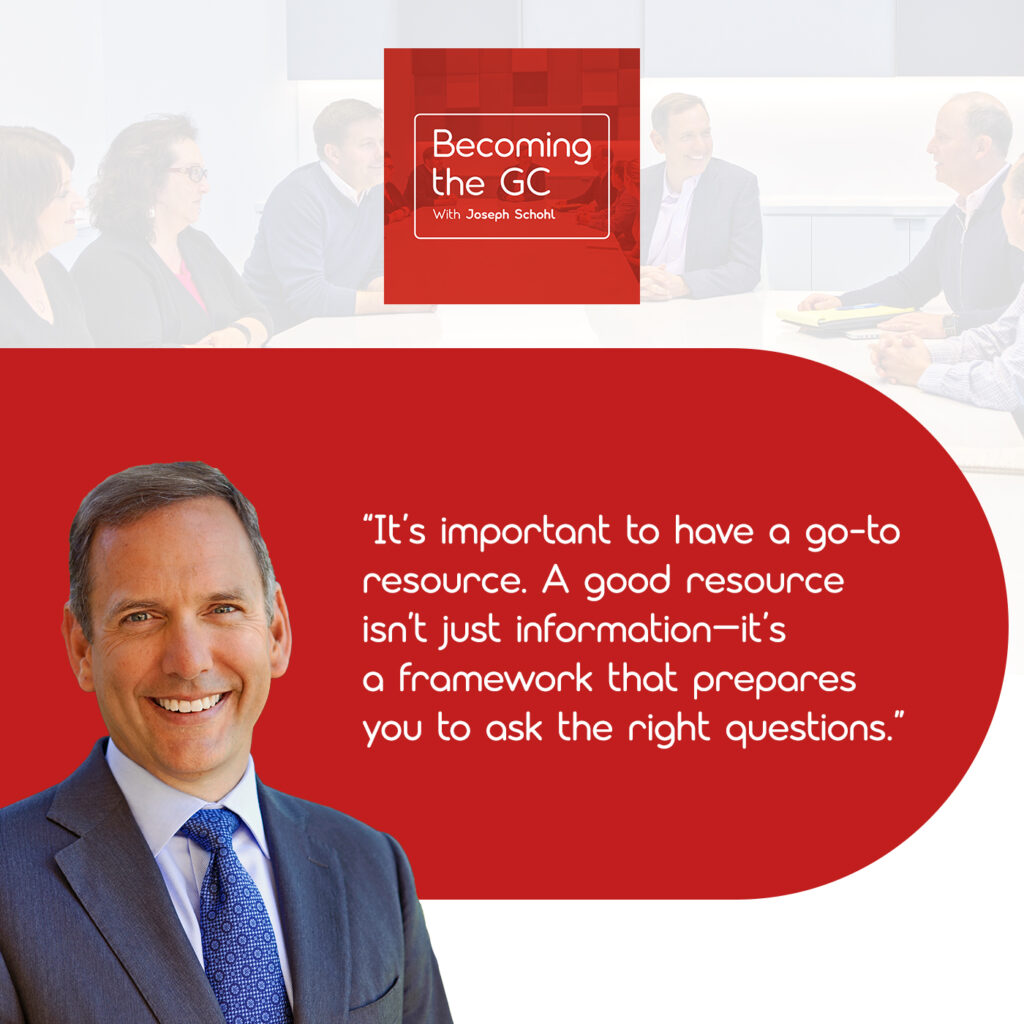
The move to in-house is described by many, and certainly by me, as you get a lot more responsibility, and at least a little more control over your life and your schedule. Not complete because it’s a service business, but more so than being in a large law firm. The responsibility is quite high.
That’s completely accurate. When I was at Lennar, we had multiple lawyers, but I was the only lawyer attached to several different business units. For all intents and purposes, for those business units, I was their only lawyer. I could bounce things off in-house counsel, other in-house counsel, and outside counsel, but I was the trusted advisor for many business divisions, which was exciting and good for my growth. It was good for my career in terms of having that responsibility rather than the multiple layers at a law firm that you have to deal with.
Is that when you first started to aspire to maybe someday be the GC?
Effectively, I was the GC for smaller business units at Lennar, but there were always the lawyers above me. I thought working with those folks was something that I always aspired to. My career progression in general was I wanted to push myself and realize the pinnacle of whatever I was working on. The GCs or the top dog, so to speak in an in-house legal department, I knew that that was something I wanted to shoot for. I’ve now been one for a couple of years. I’m pleased with how it’s gone so far.
Overcoming Growth Challenges In General Counsel Roles
As you were making that progression and serving in those roles as general counsel to your clients, the business unit that you were serving, were there any growth opportunities that you faced along the way?
Being an in-house lawyer yourself in a previous life, I’m sure you know that it’s sometimes frustrating being a jack of all trades and master of none. Being the only lawyer for several business units, you’re not dealing with the same legal issue that comes up every day. You quickly have to get up to speed, learn, and have a general knowledge of employment law issues, transactional type issues, ethical issues, and all sorts of things that you could think of. That always would keep it fresh in the sense that I was dealing with the same business people, but the legal issues would change. Professionally, I was always having to learn something new. That organic growth happened by virtue of the role that I was in.
Tell us then about the transition from Lennar into Galardi.
I’d been at Lennar for about ten years. I knew I was at the point in my career where I think I could make the jump to being that general counsel. I was presented with a couple of different opportunities around that time. I looked at the one that I thought made the most sense for myself professionally and for my family. A lot of it is field-based. The Galardi Group has been around. John Galardi founded Wienerschnitzel in 1961, and now his son is running the Galardi Group. It’s an enduring brand in our community and, hopefully, in our nation before we know it.
There’s still a real family feel to it. Employees stick around. Many employees have been there for 40-plus years. They treat their employees right. They have high expectations, but it’s a good place to work. I jumped right in. I was nervous that I was going from home building construction to QSR, a fast-food concept, and I didn’t have much experience with that. There’ve been a lot of similarities. We’re largely franchised in the sense that we have franchise agreements, and an actual franchisee is operating the restaurants.
Whereas at Lennar, we were the general contractor, but we weren’t out there swinging hammers and fitting plumbing pipes. We would hire subcontractors to do that. There’ve been more similarities than I thought, but at the end of the day, issues are new all the time. Even if you’re at Lennar, you’re dealing with a land-use issue that you never dealt with before. You learn on the job, you learn on the fly, you have a group of trusted resources, and you continue to lean on them.
We’re having this conversation, and as I’m thinking of it, I lean on you. When I first started, Joe was kind enough to reach out and offer some general counsel training sessions that I took advantage of. It helped me through some times when I was getting my footing and having someone seasoned and gone through a lot of these issues before. Having that advice was very helpful. I give you a little plug, Joe.
Thank you. Some of the things we talked about were related to team management. Was that something new to you in the Galardi position, or had you managed a good-sized team at Lennar?
People generally understand that you may not know something off the top of your head, but if you’re willing to look into it quickly and efficiently, that’s usually enough. Share on XAt Lennar, we had a paralegal team and a secretarial team, but they weren’t assigned to a particular person. If you needed assistance, you could reach out to them. There was supervisory responsibility, with respect to the projects they were working on, but not as much on the other issues, the HR issues and the like. That was new to me having all of those issues and having to deal with them. It was nice having someone who’s gone through this, who’s outside of the organization, to be able to bounce those issues off. It’s gone well. Everyone on the team is still here, and everyone is happy. That’s all I can ask for.
What else did you have to learn to do in the GC role at Galardi that you hadn’t had to do previously or not as much time?
The biggest difference is the scale and size of the company. Lennar is a several-billion-dollar revenue organization, whereas Galardi Group is, I think we have a $400 million revenue as a chain. The resources, both internally and externally, are not the same, which is not always a bad thing. It’s understanding that we try to do a lot of the stuff in-house. We try to be as efficient as we can.
I’m not saying you’re ever inefficient elsewhere, but you don’t have access to the same resources, so you’re forced to be more efficient. That’s been the biggest challenge, but it’s been good. It forces you to roll up your sleeves and jump into some issues that you may not have known or been comfortable with before, rather than picking up the phone and calling outside counsel right away.
Managing Day-to-Day Calendar As General Counsel
It makes sense. Can I ask you some things about your day-to-day in your role as GC? How do you manage your calendar to make sure you’re able to get the important work done, not just the urgent work?
It’s always a battle. You show up, you have a general idea of what you’re going to do on a particular day, and you don’t know if 1, 2, 3, 4, or 5 fire drills are going to happen that sidetrack your entire day. You know that those fire drills are going to come up and sidetrack your day. You just don’t know how many there will be. I sit down, try to get working as quickly as possible, anticipate, and build in some time that I’m going to work on a random issue here and there. It’s going to be urgent that you’re going to tackle.
You do your best to get things done. Having a larger team now than I was used to, I have to delegate and rely on my team. A lot of my team has been with Galardi Group for a number of years. They have a lot of institutional knowledge, knowledge of our contractual documents, our policies, and our procedures. I’ve leveraged them. I’ve tried to be more efficient. It’s exciting. It can make for some longer days, but it’s good.
Are you guys in person?
We are. When I first started, we were mandatory one day in the office. I was in the office quite a bit at first, trying to learn the business and learn the people. We’re all now back in the office three days a week. It’s been good. I don’t enjoy the commute. We’re up in Tustin, which is about 30 or 45 minutes away.
Being able to interact in real-time with my colleagues is something that we all missed during COVID. You saw that we can work remotely, but is that the best socially, business-wise, and creatively for the company? There’s a lot that we can achieve when we’re all together in person. Plus, I have all sorts of fun marketing ideas that the marketing department loves to hear from.
Ensuring Involvement In Important Decisions As General Counsel
Unless you schedule a Zoom call with them to tell them all your ideas, they won’t get to hear them. How do you make sure you’re included in important decisions?
That’s a good question. It’s always been my goal in interacting with business folks not to inject myself where I’m not wanted, but to be wanted. I’m there anyway. That’s what I’ve found is the recipe for success. Business folks will have meetings, especially when I first started, and I might not know what’s going on or hear about it after the fact. When I chime in on it, instead of raising my hand and saying, “I should have been in that meeting, you need to include me in that meeting,” I provide some feedback, provide some ideas, where people start to realize, “That’s good feedback. I need this person in the meeting too.” In the meetings, you’re top of mind rather than an afterthought.
It’s not about being the 'Department of No.' It’s about finding a way to make things happen while balancing risk and guardrails. Share on XI worked with a lot of outside counsel when I was in private practice, where they were the Department of No. The in-house counsel would always throw up roadblocks and tell the business folks, “You can’t do this. You can’t do that.” I would see that those folks were not included in the decisions because the business folks looked at them as an impediment rather than a resource. I’ve asked myself, when I’m in-house, I’m not going to be that type of person. I’m going to give the appropriate advice and caution but not be that Department of No that the business folks certainly don’t like to hear.
What do you do when you’re in a board meeting, and you get asked a question, all eyes turn to you, and you don’t know the answer? Does that ever happen? It probably never happens to you, but if it did.
It happens all the time. Honesty is the best policy. It’s an old cliché, but I’ll say, “I don’t know that answer as we sit here. Let me look into it, and I’ll report back.” Do your best and report back. Everyone is usually satisfied. Where you do get in trouble is if you start to make up an answer. You may not know what type of knowledge the folks that you’re talking to have.
You certainly don’t want to lose any credibility by saying something that’s not correct or making something up that’s not appropriate. That’s what I’ve done. Folks are generally understanding that you may not know something off the top of your head, but if you’re willing to look into it quickly and efficiently, that’s usually satisfactory.
You said the follow-up so that they know it’s not going to get lost. That’s good. What about if you’re faced with a new issue that you don’t know anything about? Where do you start?
I feel like this should be sponsored by Thomson Reuters. We have a resource called Practical Law through Thomson Reuters, which has been very helpful in dealing with these types of issues. If something new comes up, they’ll have a whole in-house collection for precedent on any kind of topic you can think of. That’s been a big resource and starting point for a lot of my issues.
The other one is you have a Rolodex from practicing for almost twenty years of folks who know certain issues, certain jurisdictions. It’s leaning on those people, asking for recommendations, asking for a few minutes to chat about that. Thomson Reuters and colleagues are my 1 and 2 in terms of where I start on new issues.
I agree with that. I’m not looking for sponsors, but if they happen to be tuning in. I agree that Practical Law is a great, practical resource. I used to use, back in the day, books that were on so many topics. I think those have been integrated and updated. Maybe they’re available through Westlaw or something. I used to find those quite useful, particularly in the corporate law areas. It’s important to have that go-to resource.
Building A Strong, High-Performing Legal Team
For me, in the health law area, I have a set of AHLA books in the background that give you a head start on any conversation that you need to have in the health law area. They particularly get you up to speed. When you are reaching out to outside counsel, you’re not starting from scratch, and you’ve got a good framework for the conversation and for asking questions. Let’s shift for a moment to the team. How do you cultivate a strong, high-performing legal team?
That’s always a work in progress. One of the biggest things that I have done, that I think the team appreciates, is we have regular check-ins. It’s something my boss at Lennar did, our general counsel there. We would have weekly meetings where we would discuss pertinent issues for the whole company. Folks would bring up things that they’re working on and have those discussions. When I first started at Lennar, coming from private practice, I thought, “This is a waste of time for an hour or more. I could be billing hours. What are we doing?”
That different mindset, though, of looking at that as a collaborative time where we’re learning about the business, learning what everyone else is working on, and how we can contribute. I’ve continued that process here at Galardi. My team was not entirely thrilled with it when I started. Now it’s part of our routine. One of the days when we’re in the office, we all get together for an hour or more and talk through the issues that we’re aware of as a company, and then the individual things that we’re working on.
It’s a good sense of camaraderie that we’re all in this together. It’s also a good reflection. Our new space at Galardi Group is very open. Everyone sees when the legal team is meeting together, discussing issues, writing things on the blackboard, and posting things on the screen. They know that we are engaged, we are there, and we are available. That helps with communication too.
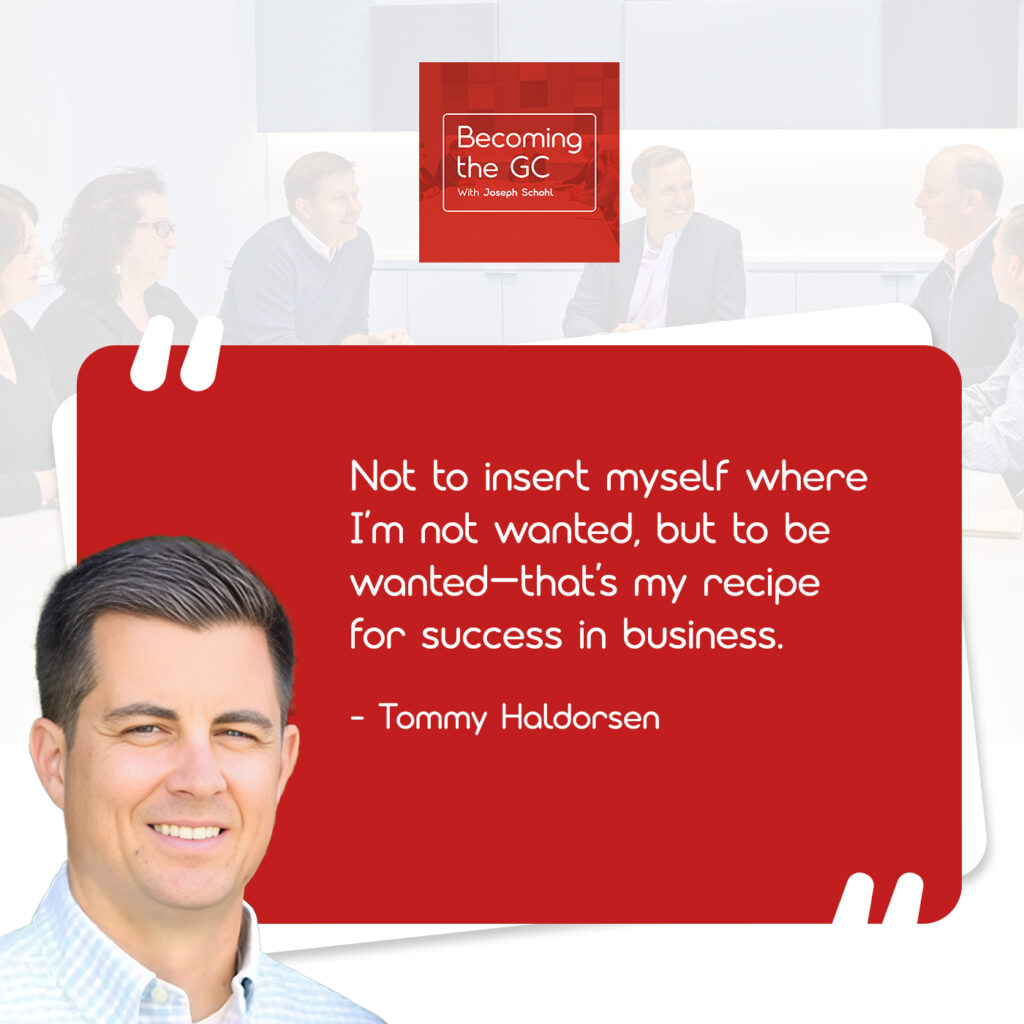
It’s very easy when we’re in a hybrid environment, especially when we are fully remote. Everyone became very siloed. Operations didn’t know what legal was doing, and marketing didn’t know what finance was doing. Being able to update everyone on what’s happening increases the satisfaction of the team and also improves performance. That’s been my biggest topic in terms of what has had a positive impact on our legal team. It is boring, but important nonetheless.
Looking Ahead: Future Goals And Aspirations
Not at all. Very important. What are you looking forward to?
The biggest thing I’m looking forward to, circling back to what you talked about at the very beginning, is that we have a research and development team at Wienerschnitzel, where we’re always testing new concepts on something that we may offer. I’ve been twisting everyone’s arms, trying to get invited to the research and development sessions. I’m going to my first one in the next few weeks, but we’re thinking about rolling out, I’d say, county fair food specials for the summer.
Funnel cake, cotton candy ice cream, all the good stuff from our youth, we’re looking into how we can roll it out. I’m looking forward to indulging a little bit in some of our delicious food on that front. That’s looking forward to with my stomach. Professionally, it’s growing the business. Part of the reason that I came over to Galardi Group was that JR, who’s our CEO, is interested in bringing this brand to the next level. We’ve had a lot of success.
We have 350-ish restaurants, mostly in the Southwest. JR wants to grow this from a $400 million revenue company to a $1 billion revenue company. To be part of that team is exciting. It helps, circling back to what I said earlier, not being the Department of No because we have the marketing team, the operations team, and JR will have all sorts of ideas that the purely risk-averse lawyer may say, “We can’t do this,” or, “We shouldn’t do this.” It’s finding a way to accomplish what they want to do while giving appropriate counsel but making it happen with the appropriate guardrails. We’re excited to hopefully build a billion-dollar revenue brand.
Do you get free food?
For you, Joe, we will get free food. I mentioned it earlier with the Galardi family, it is a family feel to the company. One of their big mission statements is serving food to serve others. It’s very involved from a charity standpoint, usually in the local community here in Southern California.
I’ve seen them.
We have a wiener wagon, we call it, and we have a food truck where we will drive to various charity events and give away free food. We were over the holidays at CASA. I don’t know what the acronym stands for, but it advocates for children who are in custody through the court system. They had a big Christmas event for these kids, and we were there serving food.
I was out there serving hot dogs, serving chili dogs, serving fries, and doing those little things. I think as society and people don’t do enough of that and don’t give enough, it’s very rewarding. It’s very cliché, but seeing the smiles on the kids’ faces, having them come back for seconds when they liked a chili cheese dog or a corn dog, it was a lot of fun.
Coaching Softball And Baseball Through The Generations
Your family, you mentioned coaching. Tell me a little bit more about that.
I come from a long line of recreational baseball coaches. My grandpa always coached my dad, and my dad coached me. I had to continue the tradition. My daughter is the oldest of three children. I started coaching her softball team when she was six years old, and I’ve continued to coach through the years. We had a run of amazing success. When she was ten years old, we played with our local league called Capo Girls Softball. We ended up winning our all-star team at the end of the year and participating in various tournaments. I think we won 5 of the 6 invitational tournaments we played.
Trust your intuition, and you'll make the right decisions. Share on XYou proceed to the big tournament of the year, which is through USA Softball, a large organization that manages softball throughout the United States. We won the district championship in our district, which is the central part of Orange County. We proceeded to play in the state championship in beautiful Lancaster, California, in the 110-degree heat in the middle of summer. We had some thrilling games, and we won the state championship. We progressed to the Western National Championship Tournament, which we were lucky, our particular year, was in Moorpark, California. We didn’t have to go to Utah or Oregon or all sorts of crazy travel. We won that too
It was an incredible ride for my daughter and for our families to go through that process. She’s now transitioned to travel ball. I’m coaching that as well. We’ve had a good team, a good run. We’re still doing well. It’s fun, and it’s exciting again for all of our family. I also help my sons too. Coaching my daughter has been a big commitment, but my sons both play baseball as well, both on the Dodgers, which I’m very happy about. I’m going to be helping both of their teams as well.
Advice To Younger Self: Lessons From Experience
You’re hitting home runs in every area of your life. I’m going to ask you anyway, if you could give one piece of advice to your younger self, what would it be?
That’s a good question. It doesn’t always feel like you’re hitting home runs because life is not always easy, and there are always challenges, professionally, socially, financially, and everything that you can think of. At the end of the day, trust yourself. Trust your judgment. Trust your intuition. There are times when you’re faced with something and it doesn’t feel right. It probably isn’t right if that’s the case. I’ve had other opportunities in my career to jump to different jobs or things that maybe pay a lot more money or seem a lot more appealing, but they didn’t feel right. Something wasn’t quite right.
If you look at the pure dollars and cents of things, you would say you made the wrong decision, you should have gone there or there, but it didn’t feel right. That’s something that my wife has told me. You’ve got to trust your intuition, and hers is probably better than mine. That’s why I would go back and say to continue to trust your intuition. You’ll make the right decisions if you do that.
Sage advice. Tommy, it’s been a real pleasure having you on the show. Thank you for coming.
Thanks for having me, Joe.
‐‐‐
Thank you for tuning in. I hope you enjoyed our time with Tommy, I know I did. A few things I’ll take from this episode include the fact that Tommy is a great all-around guy. Full disclosure, his wife, Melissa, whom he mentions in the episode, is a phenomenal lawyer herself and has worked with me at GeneralCounselWest for about ten years. I’ve known Tommy as a husband and father. As he mentioned, I’ve also worked with him as a coach. With all that, I learned so many new things from him.
He’s taken a very methodical and thoughtful approach to building his skills and knowledge so that his capability and competence have grown in tandem, which is a key attribute of executive presence. I also loved his very practical answers on what he does when he doesn’t know the answer. GCs can’t possibly know everything about everything. It’s the nature of the job to be able to learn new areas quickly and systematically. I appreciated his tips on that. Until next time, this is Joe Schohl. For more tips on accelerating your path to becoming a world-class general counsel, visit InsideCounselAcademy.com and connect with me directly on LinkedIn.
Important Links:
- Tommy Haldorsen on LinkedIn
- Galardi Group Inc. on LinkedIn
- Inside Counsel Academy
- GeneralCounselWest
About Tommy Haldorsen
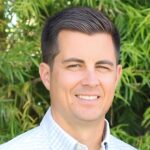
Thomas (“Tommy”) Haldorsen is a seasoned legal professional with extensive experience in corporate, transactional, regulatory, and litigation matters. Currently serving as General Counsel at Galardi Group, Inc., he oversees legal affairs for the parent company of Wienerschnitzel, Tastee-Freez, and Hamburger Stand.
Prior to this role, Thomas held key legal positions at Lennar Corporation, where he represented multiple business divisions in numerous legal capacities, including, transactional, land-use, contractual, litigation, environmental, health, and safety matters. His legal expertise was honed during his tenure at prestigious law firms at Latham & Watkins LLP and Jones Day, where he advised Fortune 500 companies—including The Walt Disney Company, PepsiCo, and Hilton Hotels—on a broad range of matters.
Thomas holds a J.D. from Harvard Law School, where he was a member of the Journal on Legislation and served as Assistant Sports Chair for the Committee on Sports and Entertainment Law. He earned his B.A. in Political Science, summa cum laude, from the University of Notre Dame, where he was elected to Phi Beta Kappa.
His early career includes time as a Analyst at the Central Intelligence Agency, where he contributed intelligence assessments and briefings for senior U.S. officials. Thomas is admitted to practice law in California and multiple federal courts.
